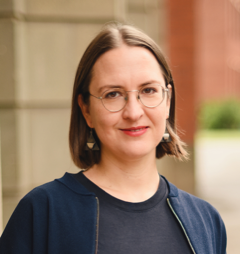
Music Cognition Matters - Music, disability and enactivism
Event details
Disability is broadly defined according to two opposing models. The medical model views disability as biological defect or dysfunction, to be treated or cured with science and medicine. The social model argues that people are not disabled by their impairments but by barriers in their environments, putting onus on society to better accommodate for disabled people. In this talk, I will consider how the social model of disability aligns with Enactivist approaches to mind and behaviour, casting disability as a matter of blocked of frustrated coupling with the environment. I will present case studies of disabled music engagement, and argue how a socio-enactivist model of disability requires us to ask new questions about disabled musical embodiment.
Maria Witek
Maria A. G. Witek is Associate Professor at the Department of Music, University of Birmingham, UK. Before taking on this post, she worked at the Center for Music in the Brain, Aarhus University and the Royal Academy of Music, Denmark, where she remains an affiliated researcher. She holds a DPhil in Music from the University of Oxford, an MA in Music Psychology from the University of Sheffield and a BA in Musicology from the University of Oslo. Her research addresses the psychology, cognitive neuroscience and cognitive philosophy of musical rhythm, body-movement and affect, using methods such as brain imaging, motion-capture, physiological recording, participatory research methods, and phenomenological and music analysis. She is currently PI on the AHRC funded project ‘Embodied Timing and Disability in DJ Practice’ and co-I on the ‘Augmented Reality Music Ensemble’ project, funded by the EPSRC. She is also the meetings chair of RPPW – the Rhythm Perception and Production Workshop.